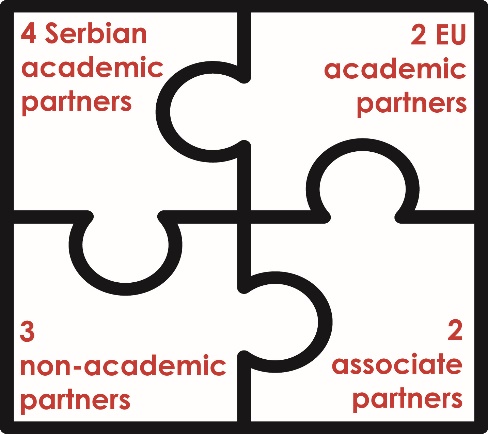PARTNERS

PARTNERS:
P1. University of Novi Sad (UNS) – coordinator
P2. Kungliga Tekniska Högskolan, Stockholm, Sweden (KTH)
P5. University of Kragujevac (UniKG)
P6. EDUCONS University, Sremska Kamenica (UESK)
P7. Provincial Secretariat for Urban Planning and Environmental Protection, Novi Sad (SUPEP)
ASSOCIATE PARTNERS:
Partner number P1
University of Novi Sad (UNS), Novi Sad, Serbia
The University of Novi Sad (UNS) was founded in 1960. It is the only state university in the Autonomous Province of Vojvodina, comprising 14 faculties and three research & developmental institutes. There are more than 50,000 students, 5,000 teaching and non-teaching staff, as well as 300 study programmes at all three academic cycles and all major fields of study and research.University of Novi Sad recognized the importance of international collaboration in education and research and hence actively participates in all available EU funding programmes (ERASMUS +, TEMPUS, HORIZON 2020, FP7, EUREKA, COST, IPA, SEE etc). UNS was the leading university in the country and the region with the highest number of TEMPUS projects which considerably helped in restructuring and reforming higher education processes, university structures and programmes, as well as policy making processes in the country. UNS has become recognized as a reform-oriented university, developing international cooperation with universities and other entities outside academia and having considerable experience in implementing academic mobility programs (CEEPUS, Campus Europae, Erasmus Mundus Action 2, ERASMUS+ Key Action 1. etc). Due to its reputation as one of the leading internationally-oriented universities in Serbia, UNS was entrusted the key coordinating role in the Priority Area 7 within the EU Strategy for the Danube Region: Developing the Knowledge Society through Research, Education and Information Technologies which significantly contributed to more intensive cooperation with the Danube Region universities through increased number of joint collaborations.International visibility and recognition are among the key strategic priorities. University of Novi Sad aims higher and pursues excellence in reserach and education.
The role in the SENVIBE project
UNS will act as the SENVIBE project Coordinator. UNS will lead WP9 – Project Management as well as WP5 concerned with the development, accreditation and implementation of a new Master programme in Vibro-Acoustics, which does not exist in Serbia. Expert work on the BA, MSc and LLL courses on Noise and Vibration (No&Vib) is entrusted to the Centre for Vibro-Acoustic Systems and Signal Processing CEVAS – officially accredited as a centre of excellence, and the Department of Environmental Engineering and Occupational Safety. Both of them belong to the Faculty of Technical Sciences (FTS) – the biggest engineering faculty in the wider region with 13 engineering departments. In context of ex-ante analysis, it is important to note that UNS and FTS have never had a No&Vib lab: as this lab will be established during the SENVIBE project, its impacts will be of paramount importance for students’ and teachers’ first-hand lab experience and knowledge.

